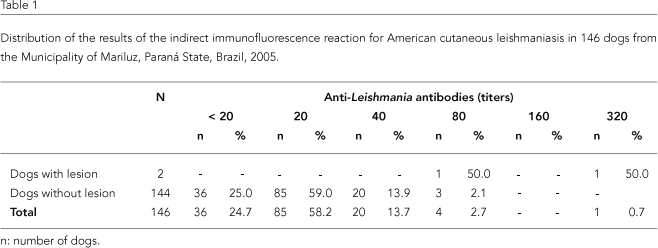Classic and molecular (polymerase chain reaction - PCR) techniques were used to diagnose American cutaneous leishmaniasis in 149 dogs from an area in the northwest of Paraná State, Brazil, where an American cutaneous leishmaniasis outbreak occurred in 2002. The results were compared to a set of previously obtained results. Twenty-five dogs had positive indirect immunofluorescence (IIF) (titers > 40), including two animals with suggestive lesions. The percentage of dogs with positive IIF was similar to that found in a previous study. The cultures of the lesion, blood and bone marrow were negative for Leishmania. A direct search for the parasite in the lesions proved negative, although PCR tests were positive. The PCR did not detect the DNA of Leishmania (Viannia) in the blood, even for those that had positive PCR in a previous study. The follow up of the 27 dogs showed that the majority of them had maintained the same levels of antibodies that had been detected previously. There was a reduction in the number of dogs with lesions, probably due to the transmission control measures that were adopted after the outbreak.
Cutaneous Leishmaniasis; Dogs; Serology


